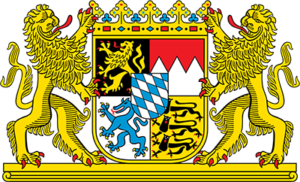Redesign of the Clinic of the University Munich, Großhadern location
In parallel to the ongoing planning for the new clinic campus, medicine and patient care are already implementing new findings
December 2018
In about 30 years, the new buildings of the Clinic will be located on the site of the present-day Clinic of the Ludwig Maximilian University (LMU) in Grosshadern. A three-digit million sum is available for the mammoth project of the Federal State. The currently centralized arrangement will become decentralized. “We will develop from a large tanker into several streamlined yachts,” says Prof. Karl-Walter Jauch, Medical Director of the Clinic of the University Munich, about the conversion. “We want to create a functionally flexible interdisciplinary structure and constantly take into account the demands of changing medical trends,” explains Jauch in an interview with Susanne Simon and Rainer Rutz from the “IZB in Dialog”.
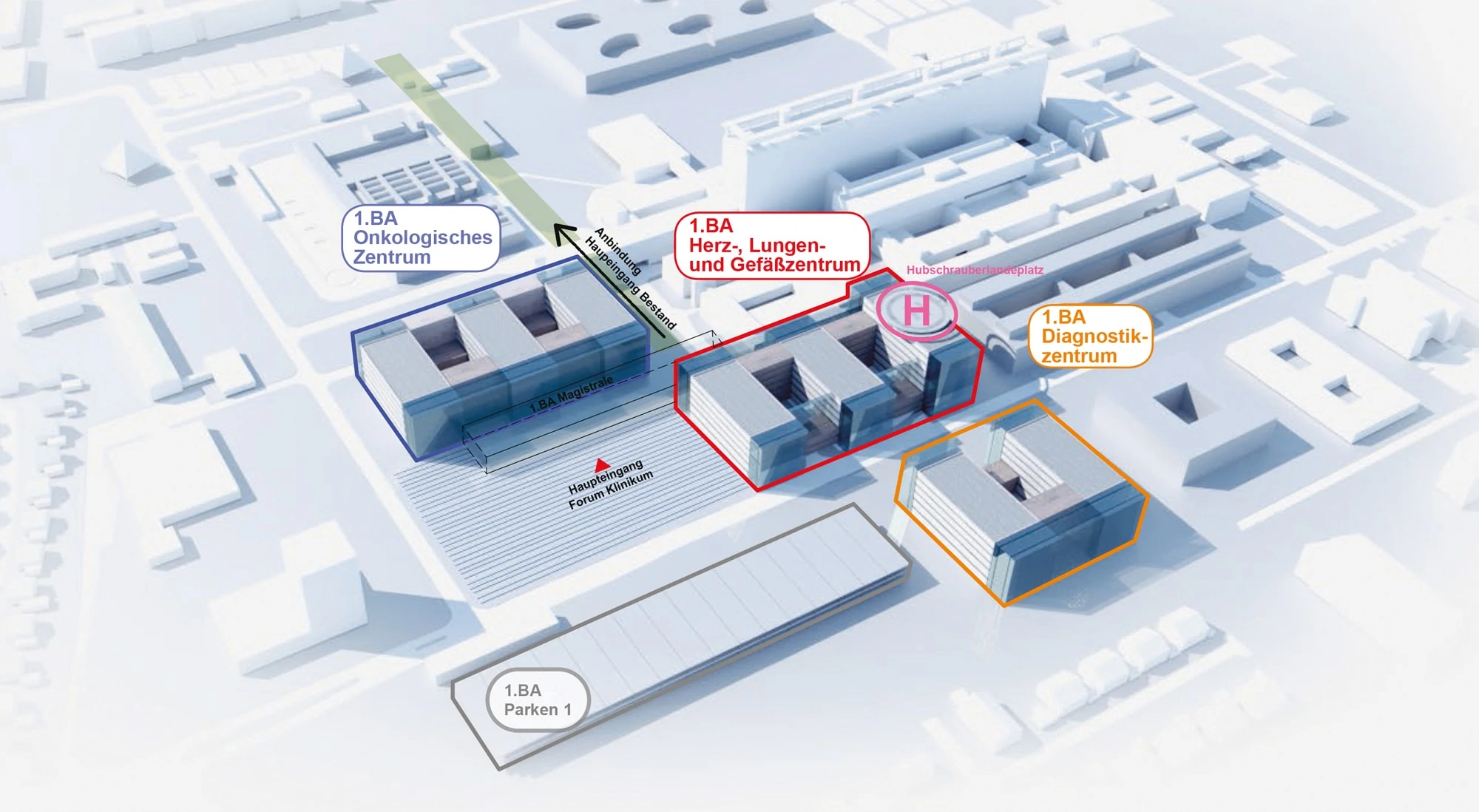
© LMU
Draft after a feasibility study from the year 2015
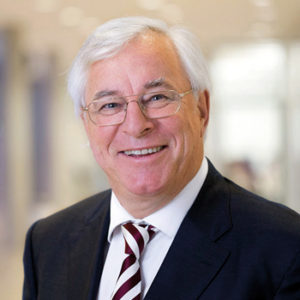
© LMU
Prof. Dr. Karl-Walter Jauch
Medical Director of the Clinic of the University Munich
Prof. Dr. Karl-Walter Jauch has dedicated himself to surgery and since 2013 has been Medical Director of the LMU Munich Clinic. Previously, he was director of the Clinic and Polyclinic for Surgery at the LMU, and Medical Director of the University Hospital Regensburg. His specialties are tumor surgery, plus metastases and transplantation medicine. In 2000 he founded a tissue bank (HTCR Foundation) and dealt with ethical and legal issues concerning body material in research. His greatest achievements in earlier work include the discovery of the hypoglycemic effect of ACE inhibitors. He was a member of the Transplant Board (2005 to 2014), President of the German Society for Surgery (2012/2013), member of the Academy of Sciences Leopoldina, and in 2016 received the Federal Cross of Merit of the Federal Republic of Germany. Since 2018, he is chairman of the University Medical Center Bavaria e.V.
Architect competition closes in 2020
In January 2019, the architectural competition for the clinic will be advertised throughout Europe; the winners will be announced in 2020. Then the specific preparations for the new buildings will begin. First, the heart-lung vascular center, oncology – both with patient beds – and diagnostics will be rebuilt. When all the departments are standing, the “toaster”, as locals call it, will be dismantled bit by bit. “As new trends in medicine keep on creating new departments, it remains to be seen whether the planned space around the clinic will be sufficient.”
The motto of the LMU Clinic and Faculty of Medicine: best minds, good structures, strong networks with the central focus on human beings
But despite the impending upheavals, activities in Grosshadern are by no means at a standstill. On the contrary: In the last two years alone, a new department and a new chair have been created for vascular surgery and neuroradiology, and five more internationally recognized physicians will be recruited for new professorships. “We are trying to create conditions in the clinic that enable high-ranking experts to realize their ideas and visions,” explains Jauch. In terms of research and clinical competence, the LMU Clinic and the Clinic “rechts der Isar” play a pioneering role internationally. Of course, this responsibility requires a lot of flexibility from the staff of the clinics.
Stroke therapy: Time is brain
On April 1, 2018, Prof. Dr. Thomas Liebig took over the Chair for Neuroradiology at the LMU and directorship of the newly established Institute for Diagnostic and Interventional Neuroradiology, which arose from the previous Department of Neuroradiology. He comes from the Charité in Berlin and is a specialist in endovascular treatment methods, including modern stroke therapy, where: Time is brain. The faster a patient is treated, the greater the likelihood that they suffer no permanent disability. With this aim in mind, the Neurovascular Network Southern Bavaria (NEVAS) was set up to provide all stroke patients in southern Bavaria with the same medical care as in the Clinic of the University Munich. Using telemedicine, all patients can be treated as if they were at the University Clinic. Besides the Grosshadern Clinic, central clinics have been set up in Gunzburg and Ingolstadt, to act as contact points for all surrounding clinics. “Complex cases come to us, the simpler ones can stay in the region,” as Jauch describes the efficiency of the network.
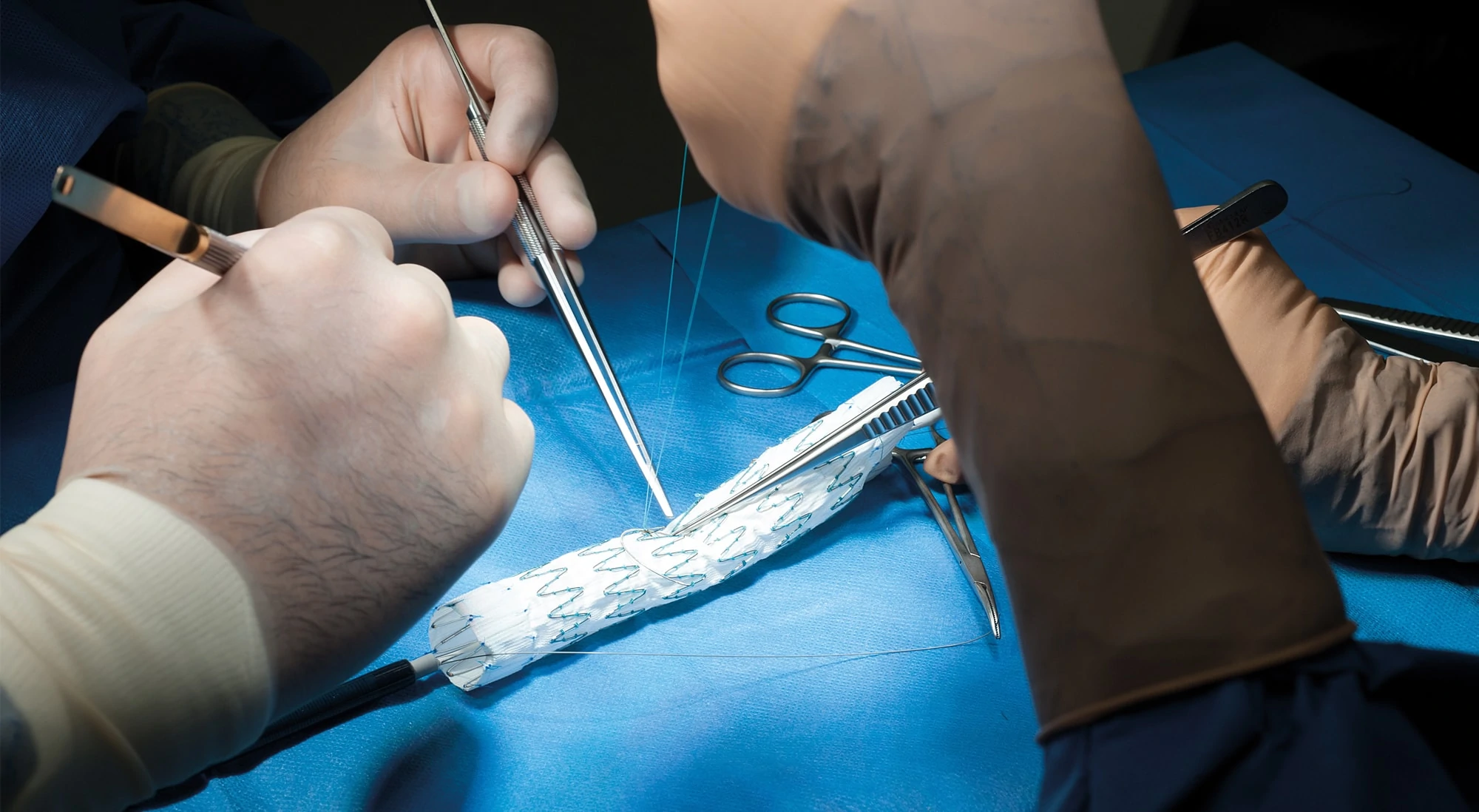
© LMU
Stent prosthesis for aortic aneurysm is adjusted individually in the operating room
Tailor-made for vascular patients
Arterial and venous vascular diseases are common, ranging from varicose veins to aortic aneurysm, enlargement of the main body artery. To meet the growing demand for vascular disease treatments, a special center for vascular surgery was opened on September 1, 2018 at the LMU Clinic. The new director of the department, Prof. Dr. Nicolaus Tsilimparis from the University Medical Center Hamburg-Eppendorf, is an outstanding expert, particularly in aortic surgery. He is one of the few specialists in the world who can modify stent prosthesis with openings and side arms for emergencies during the actual surgery. “That’s like tailor-made alterations for vascular patients,” said Jauch, pleased about this exceptional expertise. Tsilimparis explains his new concept: “We will set up a national reference center for complex vascular pathologies and work together with all specialist departments on an interdisciplinary basis.”
A new trend: Imaging and treatment
Working areas of medicine are constantly undergoing change. In the past, radiology mainly generated and analyzed images. Today, the area has become much more complex. Thus, on June 15, 2018, the clinic welcomed another leading expert in his field, Prof. Jens Ricke. He has taken on the chair of Radiology at the LMU Munich and the professorship of Radiology at the Clinic and Polyclinic in the city center and in Grosshadern. His particular research interests include minimally invasive clinical oncology and cancer therapy using image-guided microtherapy. Here, pathological changes in patients are treated using the smallest of instruments guided by live imaging. This means Ricke can also work in intact organs such as the liver, lungs or kidneys, without having to cut open these organs or the skin.
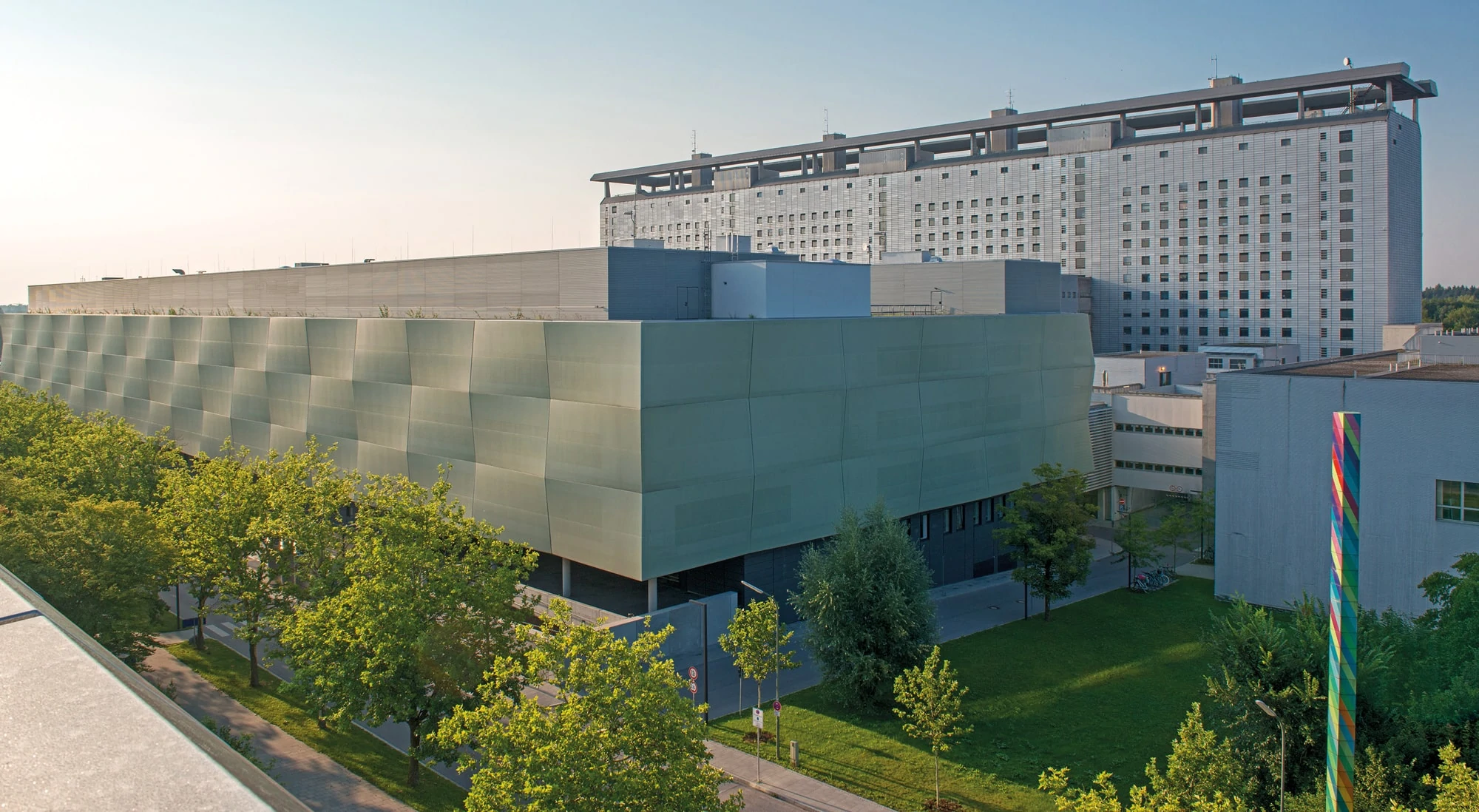
© LMU
Clinic of the University Munich, Großhadern location
Specialist in the application of new cancer therapies
Particularly in oncology, new therapies are currently always appearing on the market, especially with personalized approaches. Even the Nobel Prize winners for medicine this year received the award for innovative cancer therapy. Developments are progressing rapidly here. “The LMU Clinic, along with the Clinic “rechts der Isar”, has been certified by the German Cancer Aid Foundation as the leading center for oncological cancer, making it one of Europe’s leading cancer centers. The LMU Clinic meets the high quality standards for clinical studies, in terms of documentation, process quality, competence of doctors and nursing staff, and recruiting patients,” explains Prof. Jauch. The therapies are tailor-made for the patient. For example, this includes the antibody therapy of Morphosys, one of the largest biotech companies in Germany, which originally began as a start-up company at the Innovation and Start-up Center for Biotechnology. Leading companies Novartis and Gilead are pioneers in the new CAR-T cell therapy. “Since we work with both companies, we are one of the application centers nationwide for this promising cancer therapy,” according to Jauch.
Close cooperation between international experts
The two newly appointed directors, Prof. Dr. von Bergwelt, a specialist in immuno-oncology and Prof. Dr. Humpe, a proven expert in the field of transfusion and cell therapy, work closely together. Since December 1, 2017, Prof. Dr. Michael von Bergwelt has taken over the chair of Internal Medicine with a focus on hematology and oncology at the LMU, as well as leadership of the Medical Clinic and Polyclinic III at the University of Munich. On November 1, 2018, Prof. Dr. Lars E. French became the new director of the Clinic and Polyclinic for Dermatology and Allergology at the LMU Clinic. The internationally recognized physician and scientist, formerly working at the University Hospital in Zurich, focuses within the field of immunobiology on innate immunity and its role in inflammatory skin diseases. Further research interests include tumor immunology and the pathogenesis of severe cutaneous drug allergies. Finally, at the beginning of July, Marcus Huppertz became the clinic’s new director for patient-care. He is responsible for around 3,000 nursing staff at the LMU Clinic in Grosshadern and the city center.
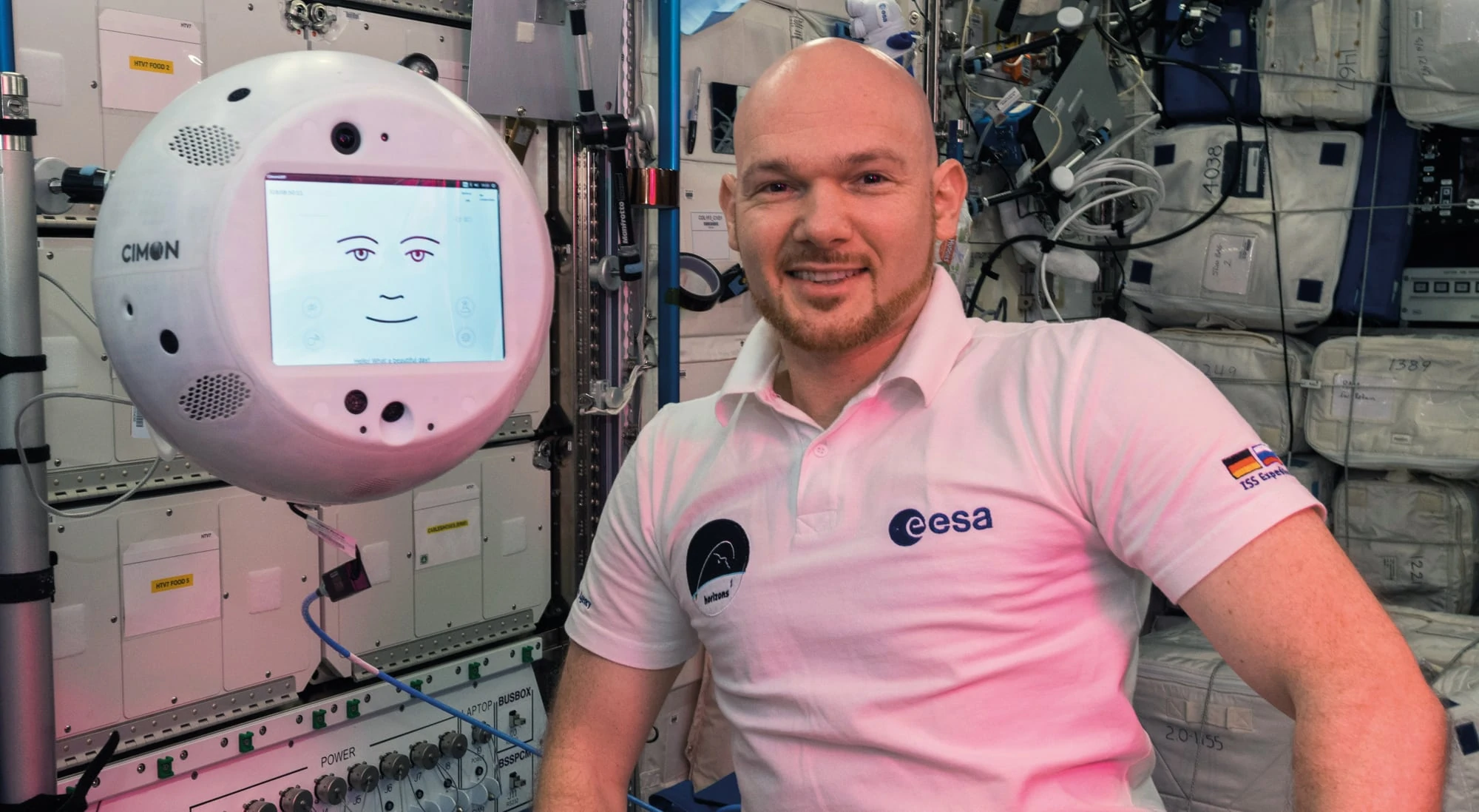
© LMU
The Clinic of the University Munich, Großhadern location, is the only clinic worldwide, who works with the ISS and Alexander Gerst on the project CIMON
Project of the Clinic: Alexander Gerst and the robot CIMON
The Clinic of the University Munich, Großhadern location, is involved in a pioneering experiment taking place in space. “We are the only clinic in the world that has worked on this project,” says Jauch proudly. It is called CIMON and concerns the development of an astronaut assistant, benefiting from the experience of LMU physicians in the groups of Dr. Judith-Irina Buchheim and Professor Dr. Alexander Chouker from the Department of Anesthesiology. Robotics and digitization will change medicine in the future. The system now being tested on the ISS space station has been co-developed by LMU medics. The experiments should provide clues about the future application of an artificial intelligence-based companion for humans, not only like now in space, but also in everyday life or in clinics. While robots cannot replace skilled staff, they can provide support with the quality and intensity of treatments. They recognize human signals, such as blood pressure, body temperature, facial expression, voice, or posture, and can classify them. CIMON interprets the emotional status of people with whom it has contact and can respond to it.
Overall, at the end of the interview Jauch concluded that with all these technologies the challenge for both physicians and nursing staff will be to always put the focus on people.
- Marchioninistraße 15
- 81377 München
- Phone: +49 (0)89/4400 – 72101
- ed.nehcneum-inu.dem@greb.aidualc
- www.klinikum.uni-muenchen.de
